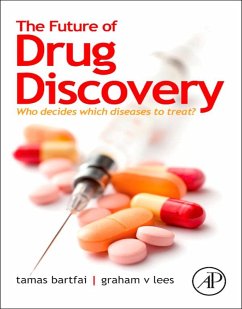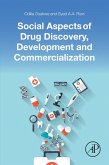The Future of Drug Discovery: Who decides which diseases to treat? provides a timely and detailed look at the efforts of the pharmaceutical industry and how they relate, or should relate, to societal needs. The authors posit that as a result of increasing risk aversion and accelerated savings in research and development, the industry is not developing drugs for increasingly prevalent diseases, such as Alzheimer's disease, untreatable pain, antibiotics and more. This book carefully exposes the gap between the medicines and therapies we need and the current business path. By analyzing the situation and discussing prospects for the next decade, the The Future of Drug Discovery is a timely book for all those who care about the development needs for drugs for disease.
- Provides an in-depth, broad perspective on the crisis in drug industry
- Exposes the disconnect between what society needs and what the drug companies are working on
- Analyses and projects over 10 years into the future
- Explains what it means for scientists and society
- Determines what is needed to be done to make sure that the industry responds to society's needs, remains commercially attractive and answers the question as to who decides which diseases to treat
Dieser Download kann aus rechtlichen Gründen nur mit Rechnungsadresse in A, B, BG, CY, CZ, D, DK, EW, E, FIN, F, GR, HR, H, IRL, I, LT, L, LR, M, NL, PL, P, R, S, SLO, SK ausgeliefert werden.
"This book reviews in exquisite detail the drug development process from the initial inception of an idea through the life cycle of a new drug entity. The authors also spend an appropriate amount of time on the role of government-funded research programs along with the role of medium and small biotechnology companies in the drug treatment of diseases.Summing Up: Highly recommended." --CHOICE Reviews Online, December 2013
"Bartfai and Lees describe the looming crisis in health care.They target society in general as their audience, because of the need for the public to understand what is happening and why they should be concerned. The book is a compendium of data and analysis and there are many tables and figures supporting the text." --Reference and Research Book News, August 2013
"A remarkable compendium of hard data and wise prescription for the pharmaceutical industry." --Michael S. Brown, 1985 Novel Laureate in Medicine or Physiology, UT Southwestern Medical Center
"This is an extraordinary, insightful and provocative book that should be read by all those concerned by the progress of biomedicine, from scientists to politicians." --Jean-Pierre Changeux, Collège de France and l'Institut Pasteur
"Bartfai and Lees raise critical issues confronting the search for new medicines. Their analysis is cogent, and their proposals thoughtful and thought provoking. For anyone curious about where new medicines come from, and what it will take for the BioPharma industry to bring new treatments to patients with Alzheimer's disease, diabetes, depression, cancer, and more, this is a must read." --Michael D. Ehlers, Senior VP Pfizer and CSO Neuroscience, former Howard Hughes Investigator, Duke University
"This book is a must read for students, prescribing physicians, academic and industry researchers, analysts, patient groups, business and science journalists, and importantly, Policy Makers. More than ever before, drug development is a complex scientific, industrial and societal endeavour that needs the combined attention of Governments, Academics and Big Pharma; it cannot be left to Wall Street alone." --Daniel Hoyer, Chair, Department of Pharmacology, University of Melbourne, former Novartis Leading Scientist
"Bartfai and Lees describe the looming crisis in health care.They target society in general as their audience, because of the need for the public to understand what is happening and why they should be concerned. The book is a compendium of data and analysis and there are many tables and figures supporting the text." --Reference and Research Book News, August 2013
"A remarkable compendium of hard data and wise prescription for the pharmaceutical industry." --Michael S. Brown, 1985 Novel Laureate in Medicine or Physiology, UT Southwestern Medical Center
"This is an extraordinary, insightful and provocative book that should be read by all those concerned by the progress of biomedicine, from scientists to politicians." --Jean-Pierre Changeux, Collège de France and l'Institut Pasteur
"Bartfai and Lees raise critical issues confronting the search for new medicines. Their analysis is cogent, and their proposals thoughtful and thought provoking. For anyone curious about where new medicines come from, and what it will take for the BioPharma industry to bring new treatments to patients with Alzheimer's disease, diabetes, depression, cancer, and more, this is a must read." --Michael D. Ehlers, Senior VP Pfizer and CSO Neuroscience, former Howard Hughes Investigator, Duke University
"This book is a must read for students, prescribing physicians, academic and industry researchers, analysts, patient groups, business and science journalists, and importantly, Policy Makers. More than ever before, drug development is a complex scientific, industrial and societal endeavour that needs the combined attention of Governments, Academics and Big Pharma; it cannot be left to Wall Street alone." --Daniel Hoyer, Chair, Department of Pharmacology, University of Melbourne, former Novartis Leading Scientist









